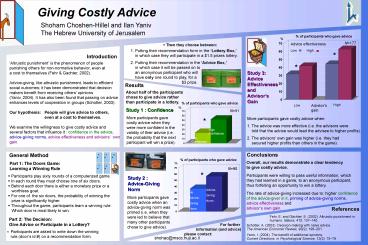Giving Costly Advice - PowerPoint PPT Presentation
1 / 1
Title:
Giving Costly Advice
Description:
... advice-giver in it, priming of advice-giving norms, ... primed (i.e. when they. were led to believe that. many other participants. chose to give advice) ... – PowerPoint PPT presentation
Number of Views:50
Avg rating:3.0/5.0
Title: Giving Costly Advice
1
Giving Costly Advice
Shoham Choshen-Hillel and Ilan Yaniv The Hebrew
University of Jerusalem
of participants who gave advice
- Then they choose between
N177
Advice effectiveness Low High
- Putting their recommendation form in the
Lottery Box, - in which case they will participate in a 1.5
prizes lottery. - Putting their recommendation in the Advice
Box, - in which case it will be passed on to
- an anonymous participant who will
- have only one round to play, for a
- 3
prize.
Introduction
Altruistic punishment is the phenomenon of
people punishing others for non-normative
behavior, even at a cost to themselves (Fehr
Gachter, 2002). Advice-giving, like altruistic
punishment, leads to efficient social outcomes
it has been demonstrated that decision makers
benefit from receiving others opinions (Yaniv,
2004). It has also been found that passing on
advice enhances levels of cooperation in groups
(Schotter, 2003). Our hypothesis People will
give advice to others, even at a cost to
themselves. We examine the willingness to give
costly advice and several factors that influence
it confidence in the advice, advice-giving
norms, advice effectiveness and advisors own
gain.
Study 3 Advice Effectiveness and Advisors Gain
Results
About half of the participants chose to give
advice rather than participate in a lottery.
of participants who gave advice
High
Low
Advisors gain
Study 1 Confidence
N51
More participants gave costly advice when they
were more confident in the validity of their
advice (i.e. the probability that the next
participant will win a prize).
More participants gave costly advice when 1.
The advice was more effective (i.e. the advisors
were told that the advice would lead the
advisee to higher profits). 2. The advisors
own gain was higher (i.e. they had
secured higher profits than others in the game).
High Confidence
Low Confidence
Conclusions
General Method
of participants who gave advice
Overall, our results demonstrate a clear tendency
to give costly advice. Participants were
willing to pass useful information, which they
had learned in a game, to an anonymous
participant, thus forfeiting an opportunity to
win a lottery. The rate of advice-giving
increased due to higher confidence of the
advice-giver in it, priming of advice-giving
norms, advice effectiveness and advisors own
gain.
Hypothesis
Part 1 The Doors Game Learning a Winning Rule
N90
- Participants play sixty rounds of a computerized
game. - In each round they must choose one of six doors.
- Behind each door there is either a monetary
prize or a - worthless goat.
- For one of the six doors, the probability of
winning the - prize is significantly higher.
- Throughout the game, participants learn a
winning rule - Which door is most likely to win.
Study 2 Advice-Giving Norm
Advice- Giving Norm
.
No Advice- Giving Norm
More participants gave costly advice when an
advice-giving norm was primed (i.e. when they
were led to believe that many other
participants chose to give advice).
References
Fehr, E. and Gächter, S. (2002). Altruistic
punishment in humans. Nature, 415, 137140.
Part 2 The Decision Give Advice or Participate
in a Lottery?
For further
Information (and advice) please contact
Schotter, A. (2003). Decision-making with naive
advice. The American Economic
Review, 93(2), 196201. Yaniv, I. (2004). The
benefit of additional opinions.
Current Directions in Psychological Science,
13(2), 7578.
- Participants are asked to write down the
winning - rule (doors id ) on a recommendation form.
shohac_at_mscc.huji.ac.il

